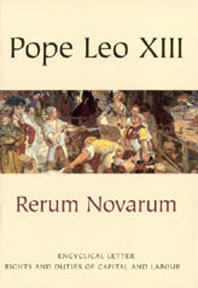Rights and Duties of Capital and Labour

Description: Rerum Novarum
Image copyright: http://www.google.com/imgres?imgurl=http://kunsoo1024.files.wordpress.com/2010/09/rerum-novarum.jpg%3Fw%3D198%26h%3D288&imgrefurl=http://kunsoo1024.wordpress.com/2010/09/08/top-10-books-to-promote-soc
"Rights and Duties of Capital and Labour"
Author:
Pope Leo XIII on May 15, 1891
Summary:
The opening words and the title of the Encyclical issued by Leo XIII, 15 May, 1891, on the "Condition of Labour". Although the Encyclical follows the lines of the traditional teaching concerning the rights and duties of property and the relations of employer and employee, it applies the old doctrines specifically to modern conditions. Opening with a description of the grievances of the working classes, it proceeds to refute the false theories of the Socialists, and to defend the right of private ownership. The true remedy, continues the pope, is to be found in the combined action of the Church, the State, the employer and the employed. The Church is properly interested in the social question because of its religious and moral aspects; the State has the right and the duty to intervene on behalf of justice and individual and social well-being; and employers and workers should organize into both mixed and separate associations for mutual protection and for self protection. All this is set forth with sufficient detail to reach the principal problems and relations of industrial and social life.
Probably no other pronouncement on the social question has had so many readers or exercised such a wide influence. It has inspired a vast Catholic social literature, while many non-Catholics have acclaimed it as one of the most definite and reasonable productions ever written on the subject. Sometimes criticized as vague, it is as specific as any document could be written for several countries in different stages of industrial development. On one point it is strikingly definite: "Let it be taken for granted that workman and employer should, as a rule, make free agreements, and in particular should agree freely as to wages; nevertheless, there is a dictate of natural justice more imperious and ancient than any bargain between man and man, that remuneration should be sufficient to maintain the wage-earner in reasonable and frugal comfort. If through necessity or fear of a worse evil the workman accept harder conditions because an employer or contractor will afford him no better, he is made the victim of force and injustice.". Although this doctrine had been a part of the traditional teaching for many centuries, it had never been stated with such precision and authority. As the years go by and thoughtful men realize more and more how difficult it is to define the full requirements of justice in the matter of wages, a constantly increasing number of persons look up on this statement of Leo XIII as the most fruitful and effective principle of industrial justice that has ever been enunciated.
Outline:
One reason compelling Leo XIII to write Rerum Novarum was his conviction that the present age has handed over the working poor to inhumane employers and greedy competitors. He saw the working poor as needy and helpless and insufficiently protected against injustices and violence. His sympathy went out to these poor, who have a "downcast heart".
There has been a strong tendency under capitalism to judge the poor harshly. Leo was not party to such judgment. He felt that most of the working poor live undeservedly in miserable and wretched conditions. The poor work so that they can procure and retain property and in order to get the means necessary for livelihood, and most of the working poor prefer to secure better conditions by honest toil, without doing wrong to anyone. The pope did, however, acknowledge that the working poor are envious of the rich, and he thought that the minds of the working poor are inflamed and always ready for disorder.
Links:
http://www.newadvent.org/cathen/12783a.htm
Reference:
http://en.wikipedia.org/wiki/Rerum_Novarum
http://www.newadvent.org/cathen/12783a.htm
http://www.shc.edu/theolibrary/resources/summary_rerum.htm
